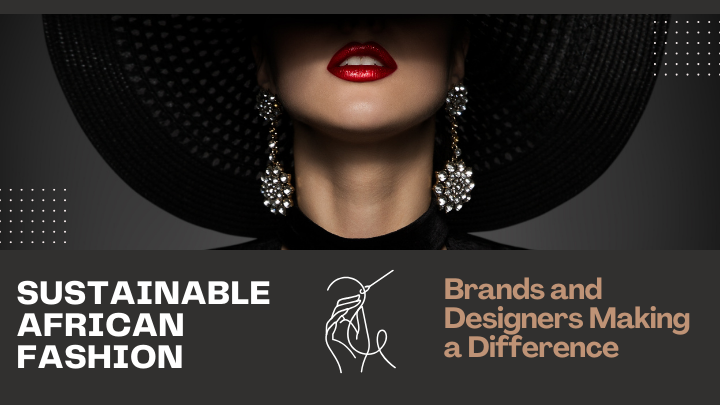Sustainable African Fashion
The fashion industry is undergoing a shift toward sustainability, and African fashion is at the forefront of this transformation. Across the continent, designers and brands are embracing eco-friendly practices, from using natural and recycled materials to preserving traditional craftsmanship. This movement not only reduces the environmental impact of fashion but also celebrates Africa's rich heritage and empowers local communities. In this article, we spotlight the African fashion brands and designers making a difference by combining style with sustainability.
Why Sustainable Fashion Matters
Fashion is one of the most polluting industries in the world, contributing to waste, carbon emissions, and water pollution. Sustainable fashion seeks to counteract this by:
- Minimizing Waste: Using biodegradable materials and adopting circular production practices.
- Promoting Ethical Practices: Supporting fair wages and safe working conditions for artisans and workers.
- Preserving Traditions: Revitalizing traditional techniques such as hand-weaving, dyeing, and embroidery.
- Empowering Communities: Investing in local economies and creating opportunities for skilled craftspeople.
Africa’s wealth of natural resources and centuries-old artisanal techniques make it a hub for sustainable fashion innovation.
Top Sustainable African Fashion Brands and Designers
1. Studio 189 (Ghana)
Founded by Abrima Erwiah and Rosario Dawson, Studio 189 focuses on social impact and sustainability. The brand works with artisans in Ghana to create handmade, eco-friendly clothing using traditional techniques like hand-dyeing and batik.
- Why It Stands Out: Studio 189 uses organic cotton, natural dyes, and upcycled materials while empowering local artisans with fair wages and training.
2. Orange Culture (Nigeria)
Founded by Adebayo Oke-Lawal, Orange Culture blends traditional Nigerian motifs with contemporary designs. The brand is known for its gender-fluid collections and commitment to ethical production.
- Why It Stands Out: Orange Culture partners with local artisans and uses eco-friendly fabrics, ensuring its creations are both stylish and sustainable.
3. SOKO Kenya (Kenya)
SOKO Kenya is a social enterprise that provides fair employment and training to local women. The brand produces high-quality garments for its in-house line and collaborations with global designers.
- Why It Stands Out: SOKO uses sustainable materials and operates under a zero-waste policy, repurposing fabric scraps into accessories.
4. Mafi Mafi (Ethiopia)
Ethiopian designer Mahlet Afework founded Mafi Mafi to preserve traditional weaving techniques while creating modern designs. The brand collaborates with local weavers to craft eco-friendly garments.
- Why It Stands Out: Mafi Mafi uses locally sourced, organic cotton and emphasizes slow fashion to reduce waste.
5. ZAAF (Ethiopia)
ZAAF is a luxury accessory brand that crafts handbags, wallets, and leather goods using traditional Ethiopian textiles.
- Why It Stands Out: ZAAF combines sustainable materials, like vegetable-tanned leather, with handwoven fabrics, promoting heritage and eco-consciousness.
6. Mayamiko (Malawi)
Mayamiko is a fair-trade brand offering sustainable clothing and accessories. It’s known for its vibrant prints and ethical practices.
- Why It Stands Out: The brand uses solar energy in its production, employs zero-waste cutting techniques, and supports local artisans with fair wages.
7. Tongoro (Senegal)
Founded by Sarah Diouf, Tongoro creates stylish, ready-to-wear garments that celebrate African culture. The brand focuses on sourcing locally and supporting West African artisans.
- Why It Stands Out: Tongoro ensures ethical production, reduces its carbon footprint, and celebrates craftsmanship in every piece.
8. Imane Ayissi (Cameroon)
Imane Ayissi’s haute couture designs highlight African textiles, such as raffia, kente, and bogolanfini (mud cloth), in luxurious creations.
- Why It Stands Out: Ayissi promotes sustainable craftsmanship by working with natural fibers and collaborating with artisans across Africa.
9. KISUA (South Africa)
KISUA blends modern design with African heritage, creating versatile pieces for global audiences. The brand prioritizes sustainability and fair trade.
- Why It Stands Out: KISUA supports African economies by sourcing materials locally and partnering with skilled tailors.
10. Hamaji (Kenya)
Hamaji, meaning “nomad” in Swahili, is a Kenyan brand that celebrates slow fashion and sustainable living. Designer Louise Sommerlatte creates timeless garments using natural and upcycled materials.
- Why It Stands Out: Hamaji incorporates hand-dyeing and traditional embroidery while championing waste reduction.
Sustainable Practices in African Fashion
African designers and brands are leading the charge in sustainable fashion by embracing:
- Natural Materials: Organic cotton, raffia, hemp, and jute are commonly used, reducing reliance on synthetic fibers.
- Eco-Friendly Dyes: Many brands use plant-based dyes and traditional methods, like batik and tie-dye, to avoid harmful chemicals.
- Artisanal Techniques: Weaving, embroidery, and beadwork are preserved through partnerships with skilled craftspeople.
- Upcycling: Scraps and discarded fabrics are repurposed into new garments, accessories, or home décor.
- Zero-Waste Fashion: Cutting-edge techniques are used to minimize fabric waste during production.
How to Support Sustainable African Fashion
- Shop Mindfully: Choose brands that prioritize sustainability and ethical practices.
- Invest in Quality: Opt for durable, timeless pieces rather than fast fashion.
- Educate Yourself: Learn about the cultural significance of African textiles and designs.
- Support Local Artisans: Buy directly from markets or platforms that empower artisans.
- Spread Awareness: Share the stories of sustainable African fashion brands to inspire others.
The Future of African Sustainable Fashion
Sustainable African fashion is more than a trend—it’s a movement that blends heritage with innovation. By embracing eco-friendly practices, African designers are redefining global fashion while fostering social and environmental impact. As more consumers prioritize sustainability, these brands are paving the way for a greener, more inclusive future.



